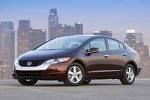After I posted these photos on my Facebook page, I kept getting the same comment over and over: "I want to go for a ride in it." Yes, you do; and I'm more than happy to take anyone for a spin. For those who haven't been following along, this is the Honda FCX Clarity, the latest innovation in fuel cell technology for automobiles. It's the greenest car around right now, right down to the interior (which is made of corn-based biofabric). Moreover, it's a luxury car, not an econo-box: this thing has so many bells and whistles I sometimes can't believe I'm driving it. Voice-activated everything (GPS, climate control, radio, cell phone link--all of it through voice commands). The GPS feature is amazing. XM satellite radio. Bluetooth "through the speakers" technology. Dual climate control. Seat heaters. Seat coolers. A hard-disk drive to rip CDs straight into the car's memory (like on-board iTunes). A jack to plug in my iPod and control it from the dashboard. I've even got a rear-mounted camera to assist with backing up. AND two other features I didn't even know existed! One is the Collision Mitigation Braking System (CMBS), which uses the forward-mounted radar (no lie--radar) to automatically apply the brakes if something is too close to the car at too high a speed. Someone cut me off on the freeway last week, and this thing started to beep at me, flash lights, and brake. The other is the Adaptive Cruise Control (ACC), which uses the same radar to maintain a driver-specified distance between me and the car in front of me. I tried it, and the car spent time getting radar lock on cars in front of me while braking and accelerating ON ITS OWN. Weirdest driving experience ever, but very cool. (The radar, by the way, is the Honda logo on the front grill.)
For those who haven't been following along, this is the Honda FCX Clarity, the latest innovation in fuel cell technology for automobiles. It's the greenest car around right now, right down to the interior (which is made of corn-based biofabric). Moreover, it's a luxury car, not an econo-box: this thing has so many bells and whistles I sometimes can't believe I'm driving it. Voice-activated everything (GPS, climate control, radio, cell phone link--all of it through voice commands). The GPS feature is amazing. XM satellite radio. Bluetooth "through the speakers" technology. Dual climate control. Seat heaters. Seat coolers. A hard-disk drive to rip CDs straight into the car's memory (like on-board iTunes). A jack to plug in my iPod and control it from the dashboard. I've even got a rear-mounted camera to assist with backing up. AND two other features I didn't even know existed! One is the Collision Mitigation Braking System (CMBS), which uses the forward-mounted radar (no lie--radar) to automatically apply the brakes if something is too close to the car at too high a speed. Someone cut me off on the freeway last week, and this thing started to beep at me, flash lights, and brake. The other is the Adaptive Cruise Control (ACC), which uses the same radar to maintain a driver-specified distance between me and the car in front of me. I tried it, and the car spent time getting radar lock on cars in front of me while braking and accelerating ON ITS OWN. Weirdest driving experience ever, but very cool. (The radar, by the way, is the Honda logo on the front grill.)
 The EPA numbers on this car suggest an in-town 77 mpg and a highway 67 mpg (if you consider a gallon of gasoline to be equal to a kilogram of hydrogen, which seems to be the industry standard, then the mpg numbers are directly comparative). Honda boasts a 270 mile range on a single 4 kg tank, but I'm topping out at about 200 miles per tank right now--which is still impressive when you consider I'm not using a drop of gas to do it. I'm sure there's a way to drive this thing so economically that I could get 270 out of a tank (and I'm finding out that other FCX Clarity drivers play this little game, too); I'm determined to get 240 out of it before the lease is up.
The EPA numbers on this car suggest an in-town 77 mpg and a highway 67 mpg (if you consider a gallon of gasoline to be equal to a kilogram of hydrogen, which seems to be the industry standard, then the mpg numbers are directly comparative). Honda boasts a 270 mile range on a single 4 kg tank, but I'm topping out at about 200 miles per tank right now--which is still impressive when you consider I'm not using a drop of gas to do it. I'm sure there's a way to drive this thing so economically that I could get 270 out of a tank (and I'm finding out that other FCX Clarity drivers play this little game, too); I'm determined to get 240 out of it before the lease is up.
In my "spare" time, I've been surfing some of the websites that review the car; I've been paying specific attention to the comments sections to see what "ordinary people" have been saying. I can respond to some of those comments here (I'm not going to actually post to the comments sections of these sites, which have a distinct "One Flew Over the Cuckoo's Nest" air about them). First, no, Honda is not just leasing these things to celebrities--I'm proof of that. Second, most experts will tell you that the Hindenburg disaster had more to do with its canvas skin being treated with the chemical equivalent of rocket fuel and less to do with being a balloon filled with flammable gas (moreover, I'm quite convinced that hydrogen containment technology is much better than it was in 1937). In any event, my car doesn't burn the hydrogen, anyway; it just combines it with oxygen to make electricity and water, which is how the Apollo moon missions were powered. (Sidebar: whenever anyone asks me about the "Hindenburg" factor, I ask them to repeat themselves and then reply, "Oh, 'Hindenburg'; I thought you said 'Exxon-Valdez'." That usually shuts them up.) Third, no, I haven't tried drinking my car's exhaust--but I will be getting around to that little experiment. And for those who have nothing better to do than scrutinize the photos: yes, the trickle of water seen in the driveway came from my exhaust pipe when I moved the car--my car is so organic that it actually pees.
The remaining two "hot" topics that people seem to be focusing on are better left for future blog posts, since I probably have quite a lot more to say--and learn--about them. One topic debates the "greeness" of hydrogen; that is, suggests that the isolation of pure hydrogen is a just-as-damaging process that negates any of the benefits of zero emissions (this one is usually suggested by those who think that the electric plug-ins are the future, not fuel cells). The other asks about the hydrogen infrastructure--the lack of filling stations needed to make fuel cell cars viable. I have thoughts on these topics, and I'll eventually get to them.
Right now, however, I think I'll go for another ride. :)








